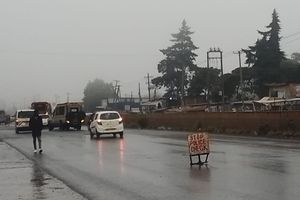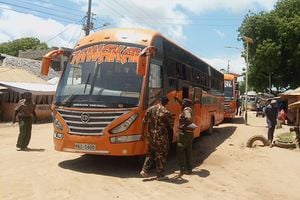
Traffic police officers mount a roadblock on Langata Road in Nairobi in mid-April 2021. (inset) Deputy Inspector-General of Police Eliud Lagat.
The plan by the government to phase out all static police roadblocks in the country, except in crime-infested areas, will need more time, Deputy Inspector-General of Police Eliud Lagat has said.
The DIG told MPs that the National Police Service (NPS) is mapping out areas they feel the roadblocks are not needed before replacing them with mobile ones.
Appearing before the National Assembly’s Departmental Committee on Security and National Administration, Mr Lagat said they have done away with most of the roadblocks which added no value.
He said the move was part of recommendations contained in the retired Chief Justice David Maraga’s task force on police reforms.
In August last year, the then Interior Cabinet Secretary Kithure Kindiki gave a November 1, 2023 deadline for the removal of the police roadblocks across the country.
He said the roadblocks will be replaced with patrol security officers who will man the highways and major transport corridors following an uproar over escalating incidents of bribery at the roadblocks.
Mr Kindiki, however, maintained that gazetted roadblocks will remain in specific areas since they are an integral part of the fight against terrorism and cross-border crime.
The move came hot on the heels of a July 2023 directive by President William Ruto ordering the removal of the static roadblocks in a bid to restore order on Kenyan roads by ensuring a smoother flow of traffic and combat rising cases of corruption on the roads.
“We are mapping out areas we feel the roadblocks are not needed because the directive is that we don’t need the roadblocks unless they are for security patrols,” said Mr Lagat.
“However, we have minimised unnecessary roadblocks and disbanded them, including traffic bases that do not add value. The static ones have been replaced with mobile roadblocks. Those that still exist are in crime-infested areas but they are on a need-be basis,” he added.
Inconvenience Kenyans
The committee’s chairperson, Narok West MP Gabriel Tongoyo said the roadblocks have been turned into toll stations where Kenyans are being extorted by traffic police.
“Someone can travel to London and back before an individual from Moyale gets to Nairobi. This is because of the unnecessary roadblocks. roadblocks should not inconvenience Kenyans in as much as they should be there for security purposes,” said Saku MP Dido Raso.
MPs have in the past raised concerns that the many police roadblocks were causing problems for transporters and business people ferrying goods’, especially along major highways and transport corridors.
They said the roadblocks, besides wasting time for traders, have become centres of corruption where security officers demand bribes from the transporters.
“Roadblocks are an old form of security in various nations. Roadblocks should be mounted on the request of the security operators to achieve a specific agenda and once it has served its purpose it’s dismounted,” said Mr Kindiki last year.
Appearing before the same committee, National Police Service Commission chairperson Eliud Kinuthia said they are in discussion to remove traffic police from non-security roadblocks.
Traffic police officers
“It is possible to do away with a majority of the traffic police officers and automate the process,” said Mr Kinuthia.
In November 2022, Mr Kindiki said the government will introduce cameras to reduce the number of traffic police officers who are accused of traffic snarl-ups on the roads.
He singled out the move, which he said will take some time, as part of road safety management measures by the government.
“We need to reduce our police officers standing on the road for the whole day. This can only be achieved by introducing camera facilities on our roads so that we can reduce what traffic police can do,” said the CS then.
The new technology will deploy an electronic surveillance technique that will see no traffic police officer manning traffic tie-ups on the roads.
“The surveillance will be mainly electronic and not a policeman opening your car. We will have a program of ensuring that we use technology to improve road safety and management,” he said.










